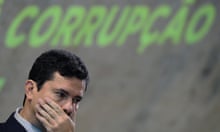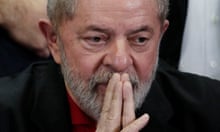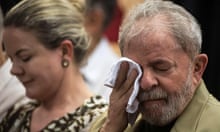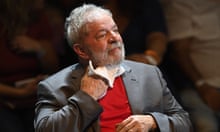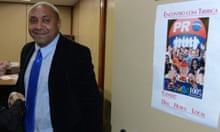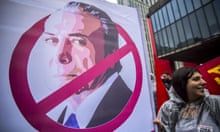The fallout from a massive bribery scandal that helped to bring down a Brazilian president is spreading across Latin America, threatening to engulf leaders from Panama to Peru.
The workings of a secret “bribery department” at the Brazilian construction conglomerate Odebrecht that suborned government officials around the world for years are being exposed by investigators. Meticulous schemes of graft laid out by witnesses, in plea deals and in leaked and seized documents show how the company funnelled $800m (£641m) of payouts to politicians and parties in Latin America alone.
As prosecutors chase the trail of that cash, it has led them towards some of the region’s most prominent figures. Brazil’s president, Michel Temer, was accused in leaked testimony last year of taking campaign funds from Odebrecht, and the Panamanian president, Juan Carlos Varela, was implicated by a man who has himself been arrested in connection with the scandal. Both deny wrongdoing. In Argentina a federal judge is seeking information from Brazil and Switzerland to determine if the head of the spy agency took a $600,000 bribe from Odebrecht, which he also denies.
But perhaps the most surprising accusations came this week, when authorities implicated two men who have based their political careers on a reputation for integrity in countries plagued by graft. Peru sent out an Interpol arrest warrant for its former president Alejandro Toledo, on charges of taking some $20m in bribes. And Colombia’s chief prosecutor has said the country’s Nobel peace prize-winning president Juan Manuel Santos may have taken money for his re-election campaign. Both men have strongly denied the charges.
Toledo, who led Peru from 2001 to 2006, rose to power leading protests against the former president Alberto Fujimori, who was later jailed for corruption and human rights abuses. The country is still reeling from the news that Toledo could be joining his old opponent in prison. The front page of the local newspaper El Comercio reproached the former president, who comes from an indigenous family, with a headline quoting a traditional Andean commandment, “Ama Sua: do not steal”.
Authorities who offered a $30,000 reward for Toledo’s capture say he took the money in return for smoothing Odebrecht’s path to a lucrative contract for a road connecting Brazil to Peru’s Pacific coast. They have sought particular help from the US, where Toledo is a visiting scholar at Stanford University, and from Israel. His wife has Israeli citizenship and the country does not have an extradition treaty with Peru, so officials fear he may try to seek refuge there.
Santos has been accused by Colombia’s chief prosecutor Nestor Martinez of taking up to $1m in campaign donations, based on the testimony of an ex-senator who was jailed for allegedly channelling Odebrecht cash but also has ties to Santos’s opponents. Martinez plans to travel to Brazil this week to look for evidence to support the accusation, Reuters reported. Santos has rejected the allegations, but the case could be particularly damaging to a leader who took a fierce public stance on the unfolding scandal.
He threatened last month that the “full weight of the law” would fall on anyone accused of taking Odebrecht cash, and his government was the first outside Brazil to arrest former officials after the firm admitted a history of corruption in a plea deal with the US justice department. Odebrecht agreed to pay $3.5bn in penalties to authorities in Switzerland, the US and Brazil to settle the case. However, many in Latin America and beyond believe that agreement could mark just the beginning of efforts to unravel a complex and entrenched network of corruption. US prosecutors, when they announced the deal, described an extraordinary normalisation of graft within the firm, that suggested few countries where it operated would have been immune.
“[They] used a hidden but fully functioning Odebrecht business unit – a ‘Department of Bribery’, so to speak – that systematically paid hundreds of millions of dollars to corrupt government officials in countries on three continents,” said the US deputy assistant attorney general Sung-Hee Suh.
Many more details about the system and the people who benefited from it are thought to be laid out in testimony from former top executives at Odebrecht, nicknamed the “end of the world confessions” by local media. They form a key part of plea deals made by 77 senior executives from the company and its former boss Marcelo Odebrecht, grandson of the founder.
They have not been made public, but few people in Brazil expect their explosive contents to stay secret forever, and a single confession leaked so far implicates the deeply unpopular Temer in taking a multimillion-pound campaign donation from the group.
He denies taking the money, but is now the second Brazilian leader whose future has been jeopardised by the firm’s corruption. It was part of the wider Car Wash scandal that was a major driver in the impeachment of Dilma Rousseff last year, although she was ousted for breaking budget laws and has not been personally implicated.
In Panama the unfolding scandal has caught up both the president and his accuser Ramón Fonseca, a former friend and one of the founders of the law firm at the centre of the Panama Papers scandal, Fonseca himself was arrested along with his business partner Juergen Mossack as part of an inquiry into his connections with Odebrecht shortly after insisting that Varela had taken campaign money from the group.
“He [Varela] told me that he had accepted donations from Odebrecht because he could not fight with everyone,” Fonseca said, without giving more details. Varela denied receiving funds and promised to make all donations to his political campaign public.

